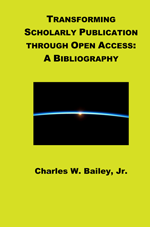De Gruyter has adopted the Creative Commons CC BY-NC-ND license for its open access content.
Here's an excerpt from the press release:
Effective immediately De Gruyter and Versita will be publishing all Open Access content under the uniform application of Creative Commons license CC BY-NC-ND. This means that publications may be copied, disseminated, and otherwise made public by users under the following conditions:
- The name of the author/copyright owner must be mentioned in the manner requested by the author/copyright owner.
- The publication and its content may not be used in its Open Access format for commercial purposes.
- The publication and its content may not be edited, modified, or otherwise changed. . . .
In 2012 De Gruyter and Versita published over 10,000 Open Access articles in some 300 journals. Since 2009 a large number of books and book chapters have also been published under the Open Access standard.
| A Look Back at 22 Years as an Open Access Publisher | Digital Scholarship |


